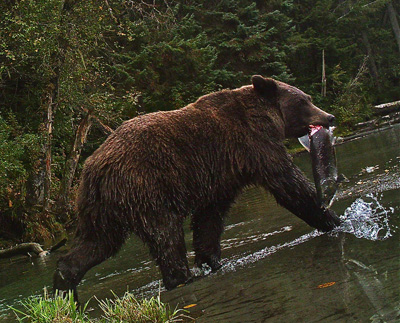Campus News
Why letting salmon escape could benefit bears and humans
Researchers at UC Santa Cruz and in Canada suggest that allowing more Pacific salmon to spawn in coastal streams would mean a long term win-win for ecosystems and humans.


Researchers at UC Santa Cruz and in Canada suggest that allowing more Pacific salmon to spawn in coastal streams will not only benefit the natural environment including grizzly bears but also mean more salmon in the ocean which would lead to larger harvests in the long term – a win-win for ecosystems and humans.
“Salmon are an essential resource that propagates through not only marine but also creek and terrestrial food webs,” said Taal Levi, a UCSC environmental studies Ph.D. candidate specializing in conservation biology and wildlife ecology.
In “Using Grizzly Bears to Assess Harvest-Ecosystem Tradeoffs in Salmon Fisheries,” published today (April 10) online in the journal PLoS Biology, Levi and co-authors, including Chris Darimont, a UCSC postdoctoral researcher in environmental studies, Chris Wilmers, UCSC assistant professor of environmental studies, and Marc Mangel, UCSC professor of applied mathematics, investigate how increasing “escapement” – the number of salmon that escape fishing nets to enter and spawn in streams – can improve the natural environment. Darimont and two other coauthors are also members of the Raincoast Conservation Foundation in British Columbia.
Levi and co-authors focused on the relationship between grizzlies and salmon. Grizzlies make an ideal research subject to determine how different levels of salmon harvest can affect the ecosystem, Levi said. He and his colleagues first used data to find a relationship between how much salmon were available to 18 grizzly bear populations in British Columbia and what percentage of their diet was comprised of salmon.
The relationship between salmon and bears is basic: “Bears are salmon-consuming machines,” Levi said. “Give them more salmon and they will consume more – and importantly, they will occur at higher densities. So, by letting more salmon spawn and be available to bears helps not only bears but also the ecosystems they nourish when they distribute the uneaten remains of salmon.”
When salmon are plentiful in coastal streams, bears thrive and produce more cubs, as many as four. Additionally, given surplus salmon, bears won’t eat as much of an individual fish, preferring the nutrient-rich brains and eggs and casting aside the remainder to feed other animals and scavengers and fertilize the land.
When salmon are scarce, bears produce fewer cubs, if any, and eat more of a fish. Less discarded salmon enters the surrounding ecosystem to enrich downstream life. Richer stream life in turn means a better environment for salmon.
Levi and his co-authors argue that, in four out of six study systems, allowing more salmon to spawn will not only help bears and the terrestrial landscape but would also mean more salmon in the ocean. More salmon in the ocean means larger harvests, benefiting fishers.
In the two systems in which helping bears would hurt fisheries, the researchers estimated the potential financial cost. They looked at two salmon runs on the Fraser River, B.C., and predicted an economic cost of about $500,000 to $700,000 annually. This cost to the human economy could help support locally threatened or extirpated grizzly bear populations, they argue.
While these fisheries are certified as sustainable by the Marine Stewardship Council (MSC), the researchers suggest that the MSC principle that fisheries have minimal ecosystem impact might not be satisfied if the fishery is contributing to grizzly bear conservation problems.
Salmon fisheries in the northwest Pacific are generally well managed, Levi said. Managers determine how much salmon to allocate to spawning and how much to harvest. Fish are literally counted as they enter the coastal streams. However, there is concern that humans are harvesting too many salmon and leaving too little for the ecosystem.
“We asked, is it enough for the ecosystem? What would happen if you increase escapement? We found that in most cases, bears, fishers, and ecosystems would mutually benefit,” Levi said.
He and the other researchers believe the same analysis can be used to evaluate fisheries around the world and help managers make more informed decisions to balance economic and ecological outcomes.